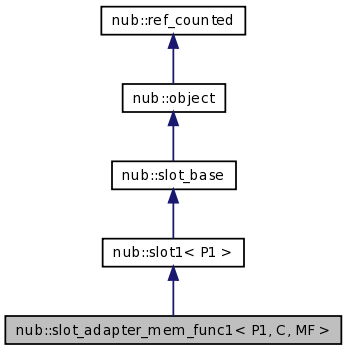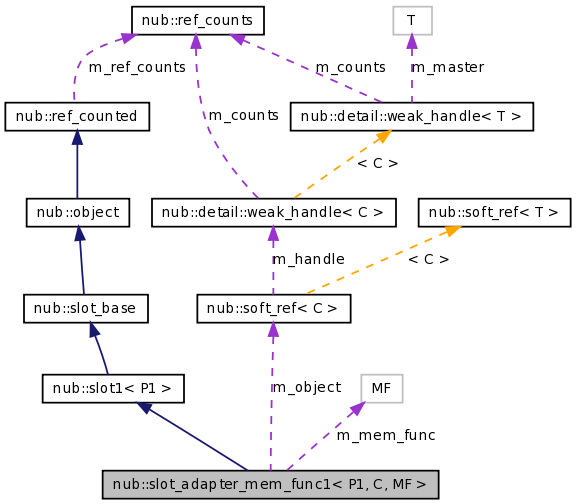nub::slot_adapter_mem_func1< P1, C, MF > Class Template Reference
A mem-func adapter for slots with one argument. More...
#include <nub/signal.h>


Public Member Functions | |
| virtual bool | exists () const |
| Answers whether the components of this slot still exist. | |
| virtual void | call (P1 p1) |
| virtual void | do_call (void *params) |
| Unpacks any parameters and then calls the implementation. | |
| nub::uid | id () const throw () |
| rutz::fstring | real_typename () const |
| Returns the typename of the full object. | |
| virtual rutz::fstring | obj_typename () const |
| Returns the (apparent) typename of the full object. | |
| rutz::fstring | unique_name () const |
| Returns a short string describing the object by its typename and id. | |
| void * | operator new (size_t bytes) |
| void | operator delete (void *space, size_t bytes) |
| void | mark_as_volatile () throw () |
| Mark this object as a volatile (unshareable) object. | |
| void | incr_ref_count () const throw () |
| Increment the object's reference count. | |
| void | decr_ref_count () const throw () |
| Decrement the object's reference count. | |
| void | decr_ref_count_no_delete () const throw () |
| Decrement the object's reference count, but don't delete it. | |
| bool | is_shared () const throw () |
| Returns true if no external client has sole ownership of the object. | |
| bool | is_unshared () const throw () |
| Returns true if there is a sole external owner of the object. | |
| bool | is_not_shareable () const throw () |
| ref_counts * | get_counts () const throw () |
| Returns the object's reference count manager. | |
| int | dbg_ref_count () const throw () |
| FOR TEST/DEBUG ONLY! Returns the object's (strong) reference count. | |
| int | dbg_weak_ref_count () const throw () |
| FOR TEST/DEBUG ONLY! Returns the object's weak reference count. | |
Static Public Member Functions | |
|
static slot_adapter_mem_func1 < P1, C, MF > * | make (C *obj, MF mf) |
| template<class FF> | |
| static nub::soft_ref< slot1< P1 > > | make (FF f) |
Detailed Description
template<class P1, class C, class MF>
class nub::slot_adapter_mem_func1< P1, C, MF >
A mem-func adapter for slots with one argument.
Definition at line 229 of file signal.h.
Member Function Documentation
| virtual bool nub::slot_adapter_mem_func1< P1, C, MF >::exists | ( | ) | const [inline, virtual] |
Answers whether the components of this slot still exist.
This allows a slot adapter, for example, to indicate if its target object has disappeared. Default implementation returns true always.
Reimplemented from nub::slot_base.
| nub::uid nub::object::id | ( | ) | const throw () [inherited] |
| rutz::fstring nub::object::real_typename | ( | ) | const [inherited] |
Returns the typename of the full object.
The result is a demangled version of typeid(*this).name(), which should very closely resemble the way the object was declared in source code.
Definition at line 67 of file object.cc.
References rutz::demangled_name().
Referenced by nub::object::obj_typename().
| rutz::fstring nub::object::obj_typename | ( | ) | const [virtual, inherited] |
Returns the (apparent) typename of the full object.
The default implementation just returns real_typename(). However, certain kinds of objects -- e.g., proxy objects -- might usefully choose to have obj_typename() return something besides the real_typename(), in order to masquerade as a different type of object.
Reimplemented in io::proxy< C >, io::const_proxy< C >, MtxObj, and TrialMemFuncEvent.
Definition at line 73 of file object.cc.
References nub::object::real_typename().
Referenced by io::legacy_reader::read_root(), and nub::object::unique_name().
| void * nub::ref_counted::operator new | ( | size_t | bytes | ) | [inherited] |
Class-specific operator new; protected to ensure that clients use factory functions.
Definition at line 157 of file refcounted.cc.
| void nub::ref_counted::operator delete | ( | void * | space, | |
| size_t | bytes | |||
| ) | [inherited] |
Class-specific operator delete; private since deletion should only happen in ref_counted::decr_ref_count.
Definition at line 163 of file refcounted.cc.
| void nub::ref_counted::incr_ref_count | ( | ) | const throw () [inherited] |
Increment the object's reference count.
This operation (on the strong reference count) is not permitted if the object is unshareable. Unshareable objects can only have their weak reference counts manipulated.
Definition at line 207 of file refcounted.cc.
References nub::ref_counts::acquire_strong().
Referenced by GxEmptyNode::make().
| void nub::ref_counted::decr_ref_count | ( | ) | const throw () [inherited] |
Decrement the object's reference count.
If this causes the reference count to fall to zero or below, the pointee and the pointer will be destroyed by a call to 'delete this'. This operation (on the strong reference count) is not permitted if the object is unshareable. Unshareable objects can only have their weak reference counts manipulated.
Definition at line 212 of file refcounted.cc.
References nub::ref_counts::release_strong().
| void nub::ref_counted::decr_ref_count_no_delete | ( | ) | const throw () [inherited] |
Decrement the object's reference count, but don't delete it.
Unlike decr_ref_count(), the object will NOT be delete'd if the reference count falls to zero. This operation (on the strong reference count) is not permitted if the object is unshareable. Unshareable objects can only have their weak reference counts manipulated.
Definition at line 221 of file refcounted.cc.
References nub::ref_counts::release_strong_no_delete().
| bool nub::ref_counted::is_shared | ( | ) | const throw () [inherited] |
Returns true if no external client has sole ownership of the object.
This may occur if either (1) the reference count is greater than one, or (2) the object is_not_shareable(), meaning that the object itself is the only "owner".
Definition at line 226 of file refcounted.cc.
References rutz::mutex_atomic_int::atomic_get(), nub::ref_counted::is_not_shareable(), and nub::ref_counts::m_strong.
Referenced by nub::ref_counted::is_unshared().
| bool nub::ref_counted::is_unshared | ( | ) | const throw () [inherited] |
Returns true if there is a sole external owner of the object.
This occurs if the reference count is one or less and the object is shareable.
Definition at line 236 of file refcounted.cc.
References nub::ref_counted::is_shared().
| bool nub::ref_counted::is_not_shareable | ( | ) | const throw () [inherited] |
Returns true if the object is not shareable for any reason. This could be because its lifespan is volatile (such as objects representing on-screen windows that can be dismissed by the user). The default is for objects to be shareable; objects can declare themselves as unshareable by calling mark_as_volatile().
Definition at line 242 of file refcounted.cc.
References nub::ref_counts::m_volatile.
Referenced by nub::ref_counted::is_shared().
The documentation for this class was generated from the following file:
- src/nub/signal.h